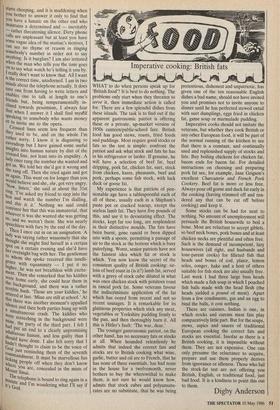Imperative cooking: British fats
n..)01,....*JoRtLe serifk.„),ft WHAT to do when persons speak up for 'British food'? It is best to do nothing. The problems only start when they threaten to serve it, then immediate action is called for. There are a few splendid dishes from these islands. The task is to find out if the apparent gastronomic patriot is offering these or a private, up-market version of 1950s canteen/public-school fare. British food has good stews, roasts, fried foods and puddings. Most require good stocks or fats so the test is simple: confront the patriot and ask what stock and fats he has in his refrigerator or larder. If genuine, he will have a selection of beef fat, beef dripping, pork fat, chicken fat, suet, stock from chicken, hares, pheasants, beef and pork, perhaps some fish stock, with luck duck or goose fat.
My experience is that patriots of pen- sionable age have a tablespoonful each of all of these, usually each in a Shipham's paste pot or cracked teacup, except the useless lamb fat. They have five pounds of this, and use it to devastating effect. The stocks, kept far too long, are resplendent in their distinctive moulds. The fats have been burnt, gone rancid or been dipped into with a spoon, permitting a passage of air to the stock at the bottom which is busy putrefying. Worst, senior patriots have not the faintest idea which fat or stock is which. You now know the secret of the consistent quality of British cooking: sir- loin of beef roast in (is it?) lamb fat, served with a gravy of stock cube diluted in what was once chicken stock with potatoes roast in rancid pork fat. Some veterans favour the indiscriminate application of the fat which has oozed from recent and not so recent sausages. It is remarkable for its glutinous properties which stick any meat, vegetables or Yorkshire pudding firmly to the pan, and then thoroughly burn it. All this is Hitler's fault: 'The war, dear.'
The younger gastronomic patriot, on the other hand, has no necessary fats or stocks at all. When hounded relentlessly he admits that indeed the correct fats and stocks are to British cooking what wine, garlic, butter and oil are to French, that he has none of these essentials, has had none in the house for a twelvemonth, never bothers to buy the wherewithal to make them, is not sure he would know how, admits that stock cubes and polyunsatu- rates are no substitute, that he was being pretentious, dishonest and unpatriotic, has given one of the ten reasonable English dishes a bad name, should not have invited you and promises not to invite anyone to dinner until he has perfected stewed oxtail with suet dumplings, eggs fried in chicken fat, game soup or marmalade pudding.
Imperative cooks should not imitate the veterans, but whether they cook British or any other European food, it will be part of the normal running of the kitchen to see that there is a constant, and continually used and replenished supply of stocks and fats. Buy boiling chickens for chicken fat, bacon ends for bacon fat. For detailed instructions on choosing and preparing pork fat see, for example, Jane Grigson's excellent Charcuterie and French Pork Cookery. Beef fat is more or less free. Always pour off goose and duck fat early in the cooking (having trimmed off and ren- dered any that can be cut off before cooking) and keep it.
Some stocks can be had for next to nothing. No amount of unemployment will persuade the British housewife to boil a bone. Most are reluctant to accept giblets, so beef neck bones, pork bones and at least chicken necks are plentiful and often free. Such is the demand of incompetent, lazy housewives (all right, and husbands and lone-parent cooks) for filleted fish that heads and bones of cod, plaice, lemon soles, conger, hake and a host of others suitable for fish stock are also usually free. Last week I had three large bass heads which made a fish soup in which I poached fish balls made with the head flesh (the heads yielded a pound of meat). Apart from a few condiments, gas and an egg to bind the balls, it cost nothing.
There are cuisines, Indian is one, in which stocks and carcass meat fats play comparatively little part. But for the soups, stews, aspics and sauces of traditional European cooking the correct fats and stocks are essential. Insofar as there is a British cooking, it is impossible without them. They are not expensive. One can only presume the reluctance to acquire, prepare and use them properly derives from ignorance or idleness. Those who fail the stock-fat test are not offering you British, English, or traditional food, just bad food. It is a kindness to point this out to them.
Digby Anderson


























































 Previous page
Previous page